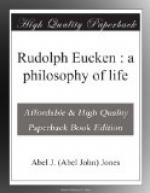And this is not all. In the present age the current of human activity is strong. Man is beginning to accomplish things in the material world, and is becoming anxious to accomplish more. His railways cover the lands, his ships sail the seas, and his aeroplanes fly through the air. He has acquired a taste for this world, a zest for the conquest and the utilising for his own pleasure and benefit of the world of nature. And when this occurs, the overworld sinks into the background—he is satisfied with the present, and feels no need, except under special circumstances, of a higher world. The sense world at present makes a strong appeal—and the stronger it becomes, the less he listens to the call of an overworld.
The sciences, history, and the special phases of human activity have drawn attention from a higher, invisible world, and have cast doubts upon its very existence.
As a result of this, “Religion (in the traditional form), despite all it has effected, is for the man of to-day a question rather than an answer. It is itself too much of a problem to interpret to us the meaning of our life, and make us feel that it is worth the living.”
In these words Eucken states his conviction that Christianity in its orthodox forms cannot solve the problem of the present. This, however, is not all he has to say concerning religion. He is, in truth, a great believer in religion, and as will be seen, he believes that later it will again step forth in a changed form as “the fact of facts” to wield a power perhaps greater than ever before.
As in the case of religion, Immanent Idealism is a theory that gives life an invisible basis, but the invisible has been regarded as that which lies at the root of the present world, and not as a separate higher world outside our own. The Divine it considers not as a personal being apart from the world, but as a power existing in and permeating it, that indeed which gives to the world its truth and depth. Man belongs to the visible world, but inwardly he is alive to the presence of a deeper reality, and his ambition must be to become himself a part of this deeper whole. If by turning from his superficial life he can set himself in the depths of reality, then a magnificent life, with the widest prospects, opens out before him. “He may win the whole of infinity for his own, and set himself free from the triviality of the merely human without losing himself in an alien world.” And if he does so, he is led to place greater emphasis upon the high ideals of life than upon material progress. He learns to value the beautiful far above the merely useful; the inner life above mere existence, a genuine spiritual culture above the mere perfecting of natural and social conditions. There is brought into view a new and deeper life in which the emphasis is placed upon the good, the beautiful, and the true. In this way idealism has inspired many men to put forth their energies for the highest aims, has lifted




